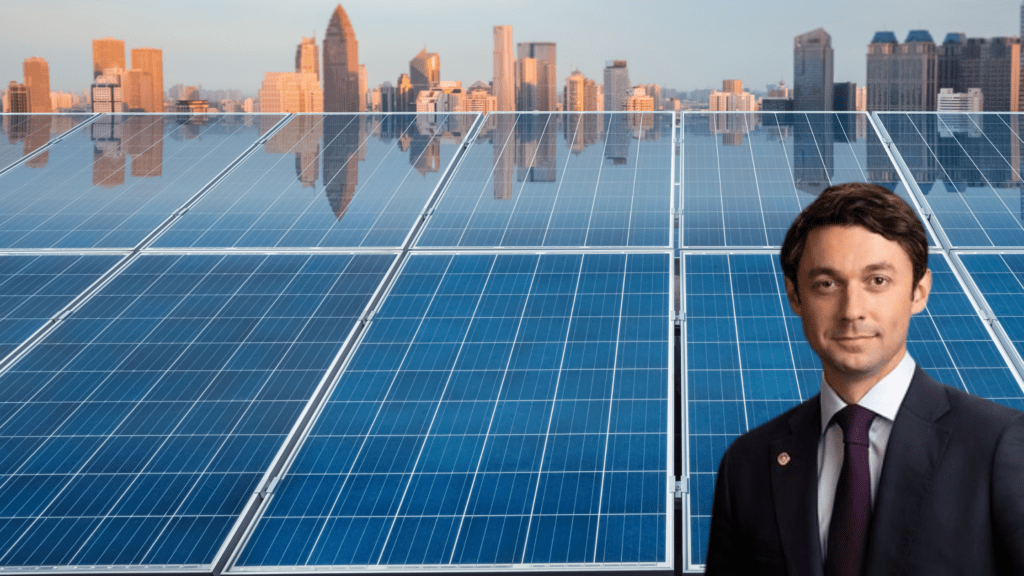Jeff Ferry \ June 30, 2021 \ Real Clear Energy
As the U.S. transitions away from fossil fuels, it’s clear that solar power will play a key role in providing clean, renewable energy for the nation. However, Washington must decide whether solar power will come from American companies and workers—or from China. That’s because years of subsidies and government support have enabled China’s state-sponsored companies to dominate the global solar supply chain. This dominance even includes the repugnant use of forced labor in Xinjiang, which has helped China to produce much of the world’s polysilicon—an essential input for solar cells.
Earlier this month, four U.S. Senators led by Georgia’s Jon Ossoff introduced legislation that would take a fundamentally different approach to America’s renewable energy sector. Sen. Ossoff and his colleagues are pressing for a comprehensive federal effort to ensure that America’s entire solar supply chain is based in the U.S.—and is independent of China. Their Solar Energy Manufacturing for America Act would provide tax credits for every stage of the solar equipment supply chain, including modules, photovoltaic cells, solar ingots, wafers, and solar-grade polysilicon.
The new Senate legislation represents a long-overdue transition from current tax credits, which are given to consumers regardless of where their solar equipment is manufactured. Since China supplies roughly 75 percent of the world’s solar equipment, almost half of all federal investment now ends up going to China. This needs to change.
China also uses forced labor in the plants that manufacture polysilicon for solar cells. Turning silicon rocks into polysilicon is an energy-intensive process, and China has added 38 gigawatts of coal-fired power plants in the last year alone to support this process. Many of these coal plants are located in the Xinjiang region, where the CCP is committing genocide against ethnic Uyghurs. In fact, China has constructed about twice as much coal-fired power as the rest of the world has decommissioned. That means, despite earnest climate goals, the world actually added net coal-based power last year. Global climate goals also suffer from the ongoing use of cargo ships—which burn the dirtiest form of fossil fuel—to transport China’s solar equipment to the U.S.
According to industry sources and our recent research at the Coalition for a Prosperous America (CPA), China has a 95 percent lock on the worldwide market for solar ingots and wafers, giving it a chokehold on the industry. Eight of the world’s top 10 producers of solar modules are Chinese companies. The solar tariffs imposed by the Trump administration have helped to boost U.S. solar module production—with U.S. firms now supplying roughly 20 percent of the U.S. market. But tariffs alone are not sufficient to counter China’s goal of dominating global industry.
Sen. Ossoff’s bill would put federal support behind a program to rebuild every step in the U.S. solar equipment production process. This would make the U.S. more energy independent, and make America the world’s second-largest producer of solar power. It would also create thousands of good-paying jobs while encouraging U.S. solar manufacturers to invest in innovative R&D.
The Ossoff bill is not perfect. The tax credits it proposes are only usable by companies that make a profit and pay corporate tax. The Ossoff tax credit should be made refundable, so that start-up solar companies and struggling solar producers could also benefit from a stimulus to their research, production, and marketing efforts.
Additionally, the Ossoff bill should set a target for 30 GW of U.S. production throughout the supply chain by 2030. Today, U.S. industry produces around 5 GW of solar modules. An ambitious target of 30 GW, roughly 75 percent of domestic demand, would spell out a reasonable U.S. goal. This would also give Congress, voters, and companies a clear objective and metric for success.
Congress must support America’s solar industry—and the support provided by America’s taxpayers deserves results. Passing the Solar Energy Manufacturing for America Act would be a great start in support of U.S. energy independence, domestic manufacturing, and the creation of good-paying clean-energy jobs.
Jeff Ferry is chief economist at the Coalition for a Prosperous America (CPA). Follow him at @menloferry.













